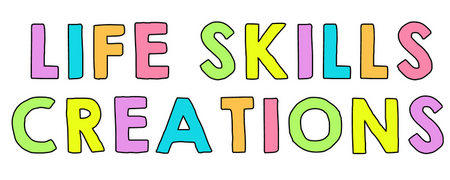FUNCTIONAL TOPICS
I started teaching in 2012 with an empty classroom and zero curriculum. I was extremely overwhelmed and completely in survival mode my first year. I quickly realized there was very limited age-appropriate material for students at the secondary level that was functional for their needs. Over the years, I started to develop REAL WORLD lessons that students would benefit from learning about to help them lead independent lives outside of the classroom.
SCOPE AND SEQUENCE FREEBIE
At the beginning of each school year, I like to map out a scope and sequence that helps me plan for functional lessons that are important to cover in my classes. You can see the FREE scope and sequence guides I use by CLICKING HERE.
I try to break the extensive list of topics into three main classes: math, english, and life skills. Some functional life skills I work on in math include counting money, telling time, menu math, simulated shopping experiences, measuring, etc. In english, we practice addressing envelopes, writing letters / thank you cards, sending emails, filling out forms (ex: job application), writing checks, etc. For life skills, we review things like reading recipes, making meals, using technology, simulated online shopping experiences, laundry, job skills, and much more.
HERE ARE SOME QUICK VISUALS TO HELP YOU COME UP WITH SOME IDEAS OF YOUR OWN:



Here are some FREEBIES for you to try out:

Here are some FREEBIES for you to try out:




WHY DO AGE-APPROPRIATE LIFE SKILLS MATTER?
It is important that we, as educators, emphasize to our students the why behind what we teach. By providing students with the reasoning behind the choices for our curriculum, we can empower them to understand the importance of these skills once they graduate from school. Teaching the quadratic equation isn’t that relevant to everyday life, but you know what is? Making a recipe correctly, learning how to place an online order, mailing a package at the post office, understanding the steps to get a job, and so many more of these types of real world skills. Motivation and engagement are a key component of learning. By making learning meaningful, we can continue to make a difference in students’ lives for years to come.




















